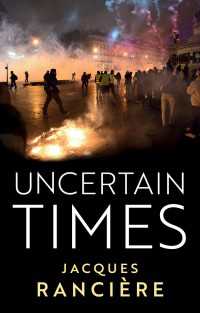- ホーム
- > 洋書
- > ドイツ書
- > Social Sciences, Jurisprudence & Economy
- > Politics, Society, Work
- > political science
Description
Development cooperation has long been a subject of controversy. Which approaches produce lasting results? Where do persistent challenges remain? And when must we acknowledge outright failure? Such questions are plentiful, yet reliable answers remain scarce. This book delivers a rigorous and nuanced assessment of development cooperation s effectiveness. Its analysis is grounded in a wide-ranging review of independent evaluation reports and several hundred expert interviews. Detailed examples from more than 50 donor and recipient countries on five continents, spanning over two decades, offer a uniquely broad evidence base. Special attention is given to European Union and German initiatives. The focus lies on the effectiveness of good governance - widely regarded as the cornerstone of global development in the 21st century. First published in German, this English edition was facilitated by artificial intelligence and subsequently revised, expanded, and updated by the authors for accuracy and relevance.
1. Development Cooperation and Good Governance: Setting the Stage.- 2. Development in Debate: Histories, Critiques, and Alternatives.- 3. Changing Agendas, Shifting Dynamics: Rethinking Development Cooperation.- 4. Good Governance as a Moving Target: Norms, Practices, and Global Agendas.- 5. Judging Aid: The Role of Evaluation in Development Cooperation.- 6. Exporting Democracy, Importing Doubt.- 7. Democracy Promotion and the Cambodian Dilemma.- 8. The Human Rights-Based Approach in Development Cooperation: Compass, Not Panacea.- 9. Power, Policy and Participation: The Global Pursuit of Gender Equality.- 10. Empowerment under Siege: Gender Equality and the Limits of International Support in Afghanistan.- 11. Between Expectations and Achievements: A Concluding Assessment.
Prof. Jörn Dosch is Chair of International Politics and Development Cooperation at the University of Rostock (Germany). Since 2003, he has led and contributed to numerous evaluations of major development programmes implemented by the European Union, Germany, Norway, Finland, the United Nations and other donors. His work bridges academic research and hands-on policy practice.
Pamina Becker studied Secondary Education with a focus on Social Sciences and Religious Education at the University of Rostock. She now lives in India, where she teaches at an international school in Chennai.







